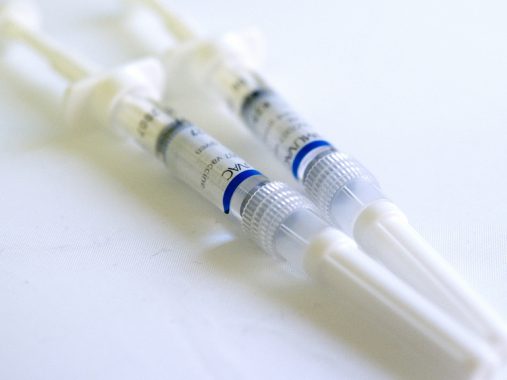The Government’s medicines watchdog has put in place a temporary regulatory change to enable GP practices and pharmacies to swap flu vaccine stocks.
This comes as NHS England said practices and pharmacies are expected to swap stocks of the adjuvanted trivalent inactivated flu vaccine (aTIV) amid supply issues.
But GPs complained that the new NHS England guidance, published today, added too much workload for GP practices and would not be workable.
Practices first raised concerns about a lack of aTIV stocks earlier this month, when they were told supplies would be phased over three months – potentially causing gaps in availability. But some practices have been unable to source any aTIV at all, with NHS England suggesting this could be in part because some GPs and pharmacies had ordered more than they needed.
However NHS England’s guidance claims there is sufficient availability of the aTIV – recommended for use in over-65s – to meet demand, urging practices and pharmacies to ensure ‘at a local level’ that the ‘stock of vaccine is distributed to meet demand’.
Normally, medication can only be passed between providers where a wholesaler licence exists, although community pharmacies are already able to transfer medicines to other healthcare providers without this licence under specific circumstances.
But the MHRA said it would now not prevent supply of the aTIV being re-distributed by practices – if there is short or no supply – as long as:
- the surgery that is holding the excess stock can give an assurance that the vaccine has been held properly in the correct temperature controlled conditions;
- confirmed record keeping of temperature monitoring is available;
- the surgery that requests the aTIV is able to verify the assurances given;
- the vaccine can be transported appropriately under the right conditions.
NHS England said that regional teams will work with local public health commissioning teams and CCGs to co-ordinate local plans for aTIV delivery if ‘gaps in availability are identified’.
But it added: ‘Clinicians are able, and expected, to work with other surgeries and pharmacies to safely move vaccine stock between locations, in order to ensure that the sufficient stock of vaccine is distributed to reflect actual demand.’
GPs expressed disappointment in how the flu vaccination programme was handled this year, and said that expecting practices and pharmacies to share vaccines is unrealistic.
West Kent LMC representative Dr Zishan Syed said: ‘Flu vaccine payments constitute an important part of practice funds. It is difficult to see how sharing of vaccines can occur if this means potential loss of funding to the practices and pharmacies concerned.
‘Many practices feel that pharmacies cherry pick patients for vaccination leaving GPs with the hard-to-reach population to vaccinate. This expectation to share vaccine might lead to the service being dropped by some practices as it becomes financially nonviable.’
Walsall LMC medical secretary Dr Uzma Ahmad said she was ‘disappointed in how the whole campaign has been managed this year’.
‘We were given very limited supply of the aTIV to start with and I’m seeing patients now who have already got the flu. The flu season has already started. I’m really worried about what the winter is going to be like,’ she said.
‘There has to be some kind of leadership from the CCGs to ensure a system is put in place to avoid any kind of competition that might exist between practices and pharmacies. I think putting that responsibility onto GPs is not right.’
Meanwhile, BMA GP Committee member and Kent LMC chair Dr Gaurav Gupta complained that the NHS England guidance ‘places the onus on affected local practices to remedy vaccine shortfalls which is diverting scarce resources.’
He said: ‘GP practices are having a difficult time this year due to the lack of timely advice regarding the flu vaccination campaign.’
GPs raised concerns about losing out on funding when pharmacies were first invited to administer flu jabs to at-risk groups back in 2015.
This year fears re-emerged after it was announced that the flu vaccine for over-65s (aTIV) would be delivered in a phased process, meaning practices could run out between deliveries and see their patients go to pharmacies instead.
Last week Pulse revealed that practices were also affected by delayed deliveries of the quadrivalent vaccine (QIV) for patients aged 18-65.
The UK’s main supplier of QIV, Sanofi Pasteur, said they were hit by a manufacturing issue, including problems with packaging, delaying deliveries to around 1,000 GP practices by two weeks.
Pulse October survey
Take our July 2025 survey to potentially win £1.000 worth of tokens
















